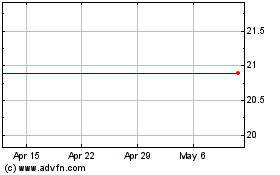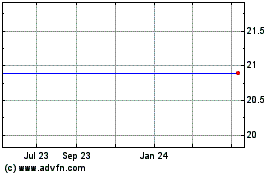HP to Buy Back $15 Billion in Stock to Battle Xerox Takeover Bid -- Update
25 February 2020 - 11:28AM
Dow Jones News
By Maria Armental
HP Inc. pledged to buy $15 billion of stock, with at least $8
billion of that in the first year, to tackle a hostile takeover
from Xerox Holdings Corp.
HP called Xerox's proposal "a fundamentally flawed value
exchange" that would create "an irresponsible capital structure"
and overstate potential savings and productivity gains from merging
the companies.
Palo Alto, Calif.-based HP on Monday said it was reaching out to
Xerox "to explore if there is a combination that creates value for
HP shareholders that is additive to HP's strategic and financial
plan."
HP disclosed the plans to boost returns to shareholders by some
$16 billion over three years as it reported first-quarter results
and raised profit projections for the year. HP shares rose more
than 4% in aftermarket trading.
The takeover fight has escalated, with HP calling Xerox's
sweetened offer too low and questioning its rival's financial
ability to follow through. Xerox has said it would seek to overhaul
HP's board and take its bid directly to HP shareholders through
what is known as a tender offer.
Xerox most recently raised the offer to $18.40 a share in cash
and a 0.149 Xerox share.
HP, which has pointed at activist investor Carl Icahn as the
driver behind the takeover bid, last week adopted a so-called
poison pill. The poison pill, a common defense to limit share
accumulations and ward off a takeover, has a trigger of 20% and
will expire on Feb. 20, 2021.
Mr. Icahn owned a roughly 4.3% stake in HP and 11% in Xerox as
of Dec. 31, according to securities filings.
At least two shareholder derivative lawsuits have been filed
over the proposed HP deal, accusing Mr. Icahn of effectively
controlling Xerox and pointing to the Icahn ties of at least five
of the Xerox's current seven members.
In a derivative suit, a shareholder or group of shareholders
typically sues on behalf of a company. Any recovery gleaned by the
plaintiffs then flows back to the company.
For the quarter ended Jan. 31, HP reported a 16% decline in
profit to $678 million, or 46 cents a share. On an adjusted basis,
profit rose to 65 cents a share from 52 cents a share a year
earlier.
Net revenue fell to $14.62 billion from $14.71 billion.
HP had projected a profit of 39 cents to 42 cents a share, or 53
cents to 56 cents a share on an adjusted basis. Analysts surveyed
by FactSet, meanwhile, expected 54 cents a share in adjusted profit
and $14.63 billion in revenue.
HP now expects to make $2.03 to $2.13 a share for the year, or
$2.33 to $2.43 a share on an adjusted basis. It previously
projected $2 to $2.10 a share, or $2.24 to $2.32 a share as
adjusted.
HP said it currently expects the impact from the coronavirus
outbreak to be felt this quarter but not necessarily beyond, with
Chinese factories resuming work. The company said the outbreak that
has caused some factories in China to remain closed for a prolonged
period would lead to an estimated 8-cent-per-share earnings hit for
HP in the current quarter and dent free-cash flow.
HP said it would support the capital-return program through cash
on hand and available debt capacity, adding that it remains
committed to maintaining its investment-grade rating.
Fitch Ratings Inc. this month changed its outlook to negative,
which indicates a potential downgrade, citing the company's
indication that it would loosen its traditionally conservative
financial policy.
"Any further material M&A (such as acquiring or being
acquired by Xerox) would similarly lead to a weakening of credit
protection metrics," Fitch wrote.
HP ended the quarter with $4.21 billion in cash, down from $4.5
billion as of Oct. 31, and about $4.86 billion in debt.
Write to Maria Armental at maria.armental@wsj.com
(END) Dow Jones Newswires
February 24, 2020 19:13 ET (00:13 GMT)
Copyright (c) 2020 Dow Jones & Company, Inc.
Xerox (NYSE:XRX)
Historical Stock Chart
From Mar 2024 to Apr 2024

Xerox (NYSE:XRX)
Historical Stock Chart
From Apr 2023 to Apr 2024
